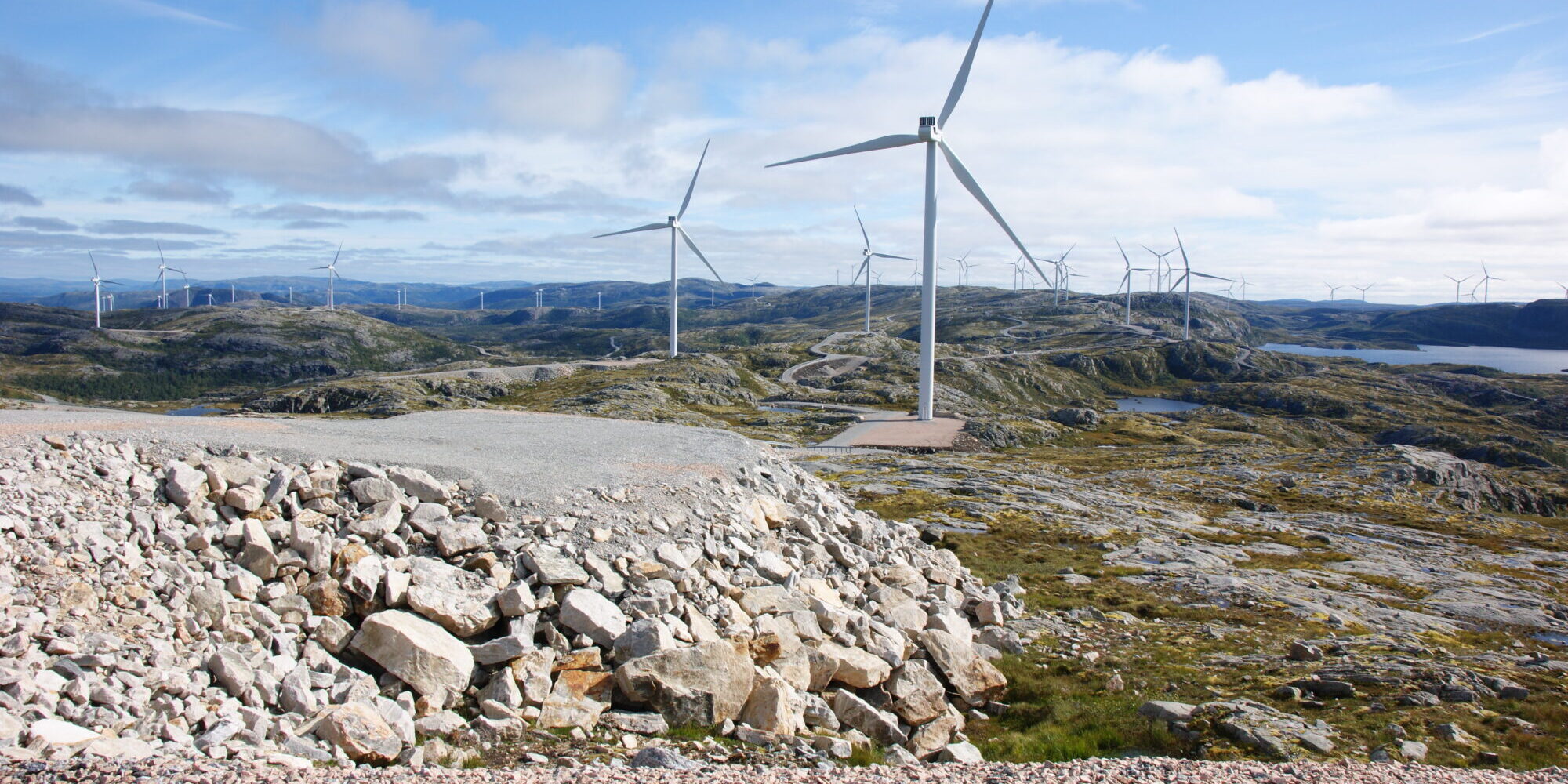
National Day in the Shadow of Fosen
Contact persons
Share article:
Saemiej åålmegebiejjie, the Sami national day, is marked every year on 6 February in memory of the first Sami national meeting which was held in Tråante/Trondheim in 1917, and celebrates the Sami as a nation.
By Henrikke Sæthre Ellingsen, NTNU/Ruralis
For the second year in a row, the national day took place under the shadow of the Fosen judgment –the Sami reindeer herders on the Fovsen-Njaarke/Fosen peninsula are still fighting against the wind power plant that was completed there in 2019. The wind power plant, which is owned by Fosen Vind DA and Statkraft, was ruled as illegal by a unanimous Supreme Court judgement in 2021 and the concession and the expropriation permit in Storheia and Roan declared invalid. The judgment is based on the fact that wind turbines seize crucial late winter grazing areas for the reindeer on Fosen, and thus that the development violates the Sami reindeer herders’ right to exercise their culture, under Article 27 of the UN Convention on Civil and Political Rights (SP).
The reindeer owners in Fovsen Njaarke Sijte have been very clear about their position: They want the plant to be demolished and the affected area returned and revegetated. The Ministry of Petroleum and Energy (OED) has now started consultation on a new investigation programme, in which demolition is not an option. Therefore, even before the consultations have started, the state has set the premise of coexistence between reindeer and wind turbines. The OED has stated that the aim now is for the wind turbines to remain, and that new mitigating measures for reindeer husbandry must be put in place. The Fosen judgment has already dealt with such measures and concluded that they are not enough to lower the threshold for SP under Article 27.
Coexistence and adaptation? Or systematic destruction?
So what do the Sami reindeer herders at Fosen think about coexistence and adaptation? Firstly, the herd does not find peace in the area due to the turbines and traffic along the roads serving the turbines, reducing their robustness. Also, after the explosions, the areas by the roads and the turbines are full of sharp stones, which the reindeer can easily injure themselves on. Accustoming the reindeer to industrial interventions such as wind turbines on a large scale changes the character of the herd, according to Leif Arne Jåma, leader of the southern group at Fosen. He says that the reindeer must maintain a natural shyness, which means that they need to stay away from settlements and people. When the reindeer become more used to people and activities, there is a danger that the herd will move towards the settlement and be exposed to new dangers such as traffic, agriculture and people, which can increase conflicts between reindeers and these other activities there. In addition to changes in the herd, everyday work will become less flexible and will demand more from the reindeer herders. They will have to spend more time than before gathering a scattered flock, and more time on case documents and in meetings to follow political processes.[1] This puts heavy pressure on many reindeer herders.
It is now well known that climate change will lead to more extreme weather and more unstable weather conditions. According to Professor Tor Benjaminsen at NMBU (2022), it is precisely the flexibility and the ability to quickly adapt when faced with changes in the climate that are the strengths of reindeer herding .[2] Flexibility and adaptability to nature and a changing climate will therefore become increasingly important in the future. The pressure Sami reindeer herding is facing from both climate change and from the technology that is supposed to help us out of the climate crisis can be described as a “double burden”.
Concession, consequences and knowledge
The consequences of reduced flexibility and more difficult conditions are potentially great. If the reindeer herding is to survive on Fosen, demolition must be an option in the new investigation programme from the OED. The experience-based knowledge of reindeer herding must be recognised, says Camilla Risvoll and colleagues at Nordland Research Institute. And Tor Benjaminsen asserts that “it is now time to end the long Norwegian tradition of teaching reindeer herding and rather recognize the reindeer herders as experts in climate adaptation.”3] The knowledge amassed within reindeer farming is important to ensure better climate adaptation in vulnerable areas.
Through my PhD project, I want – together with the reindeer herders at Fosen and other places in Norway – to research what consequences the Fosen judgment has for further wind power development over the next three years. Reindeer herding on Fosen will have access to less grazing land, a fact which in turn is used against reindeer herding when it argued that the size of the reindeer herd be reduced to match the available area. By initiating new licensing rounds, the OED has chosen to go against the Supreme Court, which says in its judgment that there is no scope for a balance of interests between the survival of Sami culture and the state’s obligations to cut climate emissions. Traditionally, indigenous peoples have been subjected to abuse and oppression both from the majority population and the state. This is precisely why indigenous law is so important, because it must contribute to ensuring that human rights violations are not allowed to continue. The Fosen judgment can, in principle, help to stop state abuses.
In June, the Truth and Reconciliation Commission investigating the Norwegianisation policy and injustice against the Sámi and Kvens/Norwegian Finns delivers its report in June this year. It will include proposals for politicians to develop measures that can contribute to further reconciliation. The commission’s leader, Dagfinn Høybråten, says that they have received many inquiries from people who are “worried about whether you can count on a Supreme Court judgment actually having consequences.”[4] In other words, the reconciliation efforts may be hindered by the state’s failure to abide by the Fosen judgment. What we are witnessing today is the opposite of reconciliation – namely a systematic destruction – or even liquidation – of reindeer herding.
Norway has been portrayed as a leading country in human rights, a position which is increasingly questioned. The unresolved situation at Fosen does now affect trust in Norwegian governing authorities, both nationally and internationally.

Henrikke Sæthre Ellingsen
Henrikke Sæthre Ellingsen is a doctoral candidate at NTNU’s Department of Sociology and Political Science, and is part of Ruralis’ research project “Collaboration for renewable energy, sustainable development and land use in local communities” (LOKAL FORNYBAR/Civic Renewables). The project is financed by the Research Council of Norway, project no. 320812.
Referanser:
[1] Risvoll, C., Riseth, J.Å., Pavall, M. & Eilertsen, S.M. 2022. Reindriftas tradisjons- og erfaringsbaserte kunnskap – hvordan synliggjøres den og hvilken gjennomslagskraft har den? Erfaringer fra utbyggingsprosesser i Nordland. Tidsskriftet UTMARK, 1, 1-11.
[2] Tor A. Benjaminsen 2022. Klimaekspertene. Tilgjengelig på: https://klassekampen.no/utgave/2022-12-10/klimaekspertene
[3] Ibid.
[4] NRK 2022. Fosen dommen kan ødelegge for forsoningsarbeidet. Tilgjengelig på: https://www.nrk.no/sapmi/fosen-dom-kan-odelegge-for-forsoningsarbeid-1.16229769
